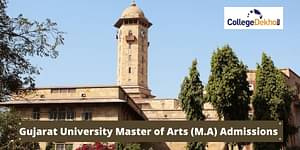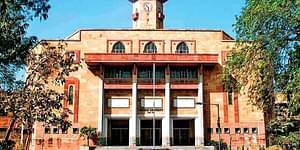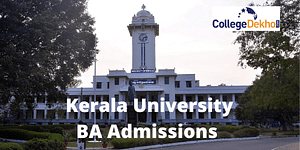MA - Master of Arts Degree Syllabus & Subjects 2024
Take a look at the Master of Arts Syllabus which includes classroom training, lectures, group discussions, field trips, and a compulsory dissertation submission. The MA Syllabus is different for every specialization and varies from course to course. MA syllabus for subjects like literature, history, fine arts, psychology, sociology, economy, politics, ethics, novels, etc. taught in the course curriculum of MA are necessary for the postgraduates to expand their knowledge in the theoretical and research aspects, which will be beneficial for them to get a better scope in jobs in India and abroad on behalf of their skills.
MA Course Syllabus & Subjects 2024
The MA syllabus focuses on academics and consists of theory and practical lessons, research projects, internships, and assignments. The syllabus and subjects for MA courses vary depending on the specialisation. For instance, the MA in Economics covers various kinds of subjects, including microeconomics, basic mathematical economics, Indian economic development and policy, and more. Subjects covered in the MA in Political Science include political sociology, political theory, critical analysis, ethics, and philosophy.
Other MA subjects that are offered are:
- Sociology: This includes the study of rural development, industrial sociology, general sociology, classical sociological theory, and perspectives on Indian society and culture.
- History: Global, Indian, ancient, contemporary, and political as well as government history of India
- Language Studies: English, Hindi, and other regional and foreign languages are studied in language studies.
The Master of Arts, or MA, is a two-year postgraduate programme that offers specialisation in a variety of subjects and humanities, languages, etc., depending on the candidate's preferences, including economics, geography, history, economics, math, sociology, and so forth. To apply for an MA programme, candidates must have completed 10+2 from a recognised institute with a minimum aggregate of 50% or higher. However, the MA admission is based on both entrance exams and academic merit. The MA course includes both core and elective subjects, which the candidate can choose based on their interests. Most MA syllabuses include classroom instruction, lectures, group discussions, field trips, and a required dissertation submission. Even so, MA Course Syllabus and MA Subjects differ by specialisation and vary by course. The MA course provides theoretical knowledge in various academic fields such as Psychology, Social Studies, Management, and Politics. Mainly, the MA syllabus covers a wide range of subjects including Novels, Economics, Politics, Sociology, Psychology, Fine Arts, History, Literature, and etc.
Also Read: Part Time Language Courses at DU
Read on to know more about MA course syllabus and subjects in detail!
Table of Contents
- MA Course Syllabus & Subjects 2024
- MA Course Details
- MA Syllabus: Semester-Wise
- Stream Wise MA Syllabus
- MA Subjects
- Specialisations Offered in MA
- Top NIRF Ranked MA Colleges in India
- Top Colleges for MA
- MA Syllabus for Entrance Exam
- MA Course Structure
- Master of Arts Teaching Methodology and Techniques
- Master of Arts Projects
- MA Important Books
- FAQs about M.A Syllabus
MA Course Details
For your ease, the details of the MA syllabus have been outlined below.
| Particulars | Details |
|---|---|
| Degree | Post Graduate |
| Full form | Master of Arts |
| Duration | 2 years |
| Age | 20 years |
| Minimum Eligibility | Must have finished graduation in the relevant subjects. |
| Average Fees | INR 10k – 80k |
| Average Salary | INR 3 - 15 LPA |
| Employment Roles | Teacher, Professor, Social Worker, Banker, Psychologist, Historian, Archaeologist, etc. |
| Employment Sectors | Schools, colleges/universities, Museums, Hospitals, Banks, etc. |
| Top Recruiters | Lady Shri Ram College for Women, HDFC Bank, ICICI Bank, National Museum, Fortis Hospital, etc. |
MA Syllabus: Semester-Wise
The MA syllabus is an academically focused syllabus that includes assignments, internships, research projects, and theory and practical lessons. For each specialisation, there is a different MA course syllabus and curriculum. In the MA first year syllabus core subjects are taught. Students can select from a variety of elective course types in the MA second year syllabus. English, Bengali, History, Economics, Sociology, Political Science, Hindi, Philosophy, and others are some of the specialties offered in the MA course.
The tables below will go over each Master of Arts course's specific topics and curriculum semester wise.
MA English Syllabus
| MA English First Year Syllabus | |
|---|---|
| Semester I | |
| Structure of Modern English | English Fiction |
| Phonology | Jonathan Swift: Gulliver’s Travels |
| Morphology | Jane Austen: Pride and Prejudice |
| Syntax | George Eliot: Middlemarch |
| Communication | Henry Fielding: Joseph Andrews |
| Semantics | Charles Dickens: David Copperfield |
| Ben Jonson: Volpone | Background to Indian English Poetry |
| Traditional English Drama | Indian Verses (Elective) |
| William Congreve: The Way of the World | Arun Kolatkar – Jejuri |
| Christopher Marlowe: Dr Faustus | Nissim Ezekiel |
| Sheridan: The School for Scandal | The Old Playhouse and Other Poems – Kamla Das |
| William Goldsmith: She Stoops to Conquer | - |
| English Language and Literature Teaching (Elective) | Research Methodology (Elective) |
| Methods and Approaches to Language Teaching | What is Research? |
| Teaching of Grammar | Constructing Research Design |
| Dimensions of Research in English Language and English Literature | Research Process |
| Teaching of Language Skills | Dimensions of Research in English Language and English Literature |
| Approaches to Teaching of Literature | Development, Hypothesis and Preparation of Research Proposal |
| Teaching of Poetry, Drama, Fiction | Major Concerns in the Thesis |
| - | Parts of the Dissertation, Presentation of Research |
| Semester 2 | |
| The Structure of Modern English | English Fiction |
| Language and Society | Thomas Hardy: Jude the Obscure |
| Distinctive Features of British, American and | Joseph Conrad: Lord Jim |
| Indian English | D. H. Lawrence: Sons and Lovers |
| Pragmatics | Graham Greene: The Power and the Glory |
| English in India | EM Forster: A Passage to India |
| Introduction to Stylistics | - |
| Modern English Drama | Indian Prose Works (Elective) |
| GB Shaw: Candida | Background to Indian Prose |
| TS Eliot: Murder in the Cathedral | Kanthapura |
| Samuel Beckett: Waiting for Godot | Lokmanya Tilak – Essays from Bal Gangadhar Tilak |
| Harold Pinter: Home Coming | RK Narayan: An Astrologer’s Day |
| John Osborne: Look Back in Anger | Rohinton Mistry: A Fine Balance |
| The Structure of Modern English | - |
| MA English Second Year Syllabus | |
| Semester 3 | |
| Literary Theory and Criticism | English Poetry |
| Aristotle: The Poetics | John Milton: Paradise Lost Book 1 |
| Dr Johnson: A Preface to Shakespeare | John Donne: The Sun Rising |
| Philip Sidney: An Apology of Poetry | Alexander Pope: The Rape of The Lock |
| William Wordsworth: A Preface to Lyrical Ballads | Andrew Marvell: To His Coy Mistress |
| Matthew Arnold: The Study of Poetry | William Blake: From Songs of Innocence |
| English Language and Literature Teaching (Elective) | |
| Methods and Approaches to Language Teaching | Teaching of Grammar |
| Relationship between Psychology and Teaching of Language | Approaches to the Teaching of Literature |
| Teaching of Poetry, Drama and Fiction | Teaching of Language Skills |
| Semester 4 | |
| Literary Theory and Criticism | English Poetry |
| T.S.Eliot: Tradition and the Individual Talent | Coleridge: The Rime of Ancient Mariner |
| F.R.Leavis: Literature and Society | William Wordsworth Poetry |
| Northrope Frye: The Archetypes of Literature | Tennyson Poetry |
| Elaine Showalter: Feminist Criticism in the Wilderness | Robert Browning Poetry |
| Ronald Barthes: The Death of the Author | W. B. Yeats Poetry |
| Shakespeare | American Literature (Elective) |
| Julius Caesar | Arthur Miller: The Death of a Salesman |
| Tempest | Background Topics |
| Macbeth | John Steinbeck: Of Mice and Men |
| Measure for Measure | Edward Albee: Who’s Afraid of Virginia Woolf |
| King Lear | Poetry |
MA Political Science Syllabus
The table below list semester wise MA Political Science Syllabus taught in the majority of India's best MA colleges.
| MA Political Science First Year Syllabus | |
|---|---|
| Semester I | Semester II |
| Western Political Thought (From Plato to Hegel) | Political Sociology |
| Political Development | Comparative Politics |
| Ancient Indian Political Thought | Indian Constitutional System |
| Research Methodology | Administrative Theory |
| Contemporary Political Theory | Texts of Philosophers |
| Theories of International Relations | Comparative Politics |
| Practical Work/ Exercise | Practical Work/ Exercise |
| MA Political Science Second Year Syllabus | |
| Semester III | Semester IV |
| Public Administration | Concept and Issue in Political Science |
| Politics in India | Post-Cold War International Relations |
| International Politics | State Politics with Special Reference to U.P. |
| Modern Indian Political Thought | Indian Administration |
| Political Sociology | Dissertation and Viva Voce |
| Interpreting Modern World | - |
| Electives | - |
MA Economics Syllabus
Here is the detailed MA Economics Syllabus, as well as various optional subjects, listed below.
| MA Economics First Year Syllabus | |
|---|---|
| Semester I | Semester II |
| Microeconomic Analysis | Macroeconomic Analysis |
| Elementary Statistics | Theory of Pricing and Distribution |
| International Trade | International Finance |
| Monetary Economics | Quantitative Methods |
| Optional Paper I | Viva-Voce |
| MA Economics Second Year Syllabus | |
| Semester III | Semester IV |
| Economics of Growth | Indian Public Finance |
| Public Economics | Economics of Agriculture |
| Issues in the Indian Economy | Growth Models in Economics |
| Economics of Industry | Selected Problems of the Indian Economy |
| Optional Paper-II | Viva-Voce |
| Optional Papers | |
| Quantitative Economics I & II | Labour Economics I & II |
| Demography I & II | Econometrics I & II |
| Economics of Gender and Development I & II | Economics of Infrastructure I & II |
| Financial Institutions and Markets I & II | Economics of Insurance I & II |
MA History Syllabus
The table below listed the MA History Syllabus taught in various Indian colleges.
| MA History First Year Syllabus | |
|---|---|
| Semester I | Semester II |
| Principles of History | Polity and Economics in Mediaeval India |
| History of Ideas in Modern India | Society, Culture and Religion in Mediaeval India |
| Twentieth Century world (up to the end of World War II) | History of Ideas in Mediaeval India |
| History of the Marathas (A.D. 1600 – A.D. 1707) or History of Republican China | State in India |
| Research Methodology and Historical Investigation | - |
| History of Ideas in Modern India | - |
| MA History Second Year Syllabus | |
| Semester III | Semester IV |
| Indian Nationalism upto 1905 | Tribal History of India with Special Reference of particular state |
| 18th to 19th century world | Historical Application in Tourism |
| Indian National Movement (1905-1947) | Status of women in Indian History |
| History of a Particular State | Dissertation |
Note: The final semester Syllabus focuses on state-specific history.
Stream Wise MA Syllabus
MA subjects taught in a course vary as per the specialization/stream selected by the student. Apart from this, slight variation in the MA syllabus can also be witnessed from one college to the other. Candidates can view the MA subjects that they would need to study as part of an MA course syllabus below:
MA Syllabus English
MA course syllabus English along with subjects has been added below.
| MA Subjects English | |
|---|---|
| Introduction to Linguistics | Poetry III (Hopkins to Ted Hughes) |
| Drama I (Marlowe to Wilde excluding Shakespeare) | Drama III (Twentieth Century Drama) |
| Poetry I (Chaucer to Blake) | Literary Criticism & Theory 1 |
| Linguistics and English Language Teaching | Indian Literature in English I/American Literature-II |
| Prose | Fiction II |
| Poetry II (Wordsworth to Arnold) | Literary Criticism & Theory II |
| Drama II (Shakespeare) | Indian Literature in English II/American Literature II |
| Fiction I (Defoe to Hardy) | Indian Literature in Translation/New Literatures in English/Women Writing |
MA Syllabus French
Students can check MA Subjects French from the table below.
| MA Subjects French | |
|---|---|
| History of French Literature from its Origin up to XIXth Century | Introduction to Linguistics |
| French Novel & French Poetry (20th Century) | Use of French |
| Introduction to Literary Analysis of Fiction and Poetry | Linguistic Approach to Translation |
| History of France | French Drama (20th Century) |
| Origin of Literature in French (Study of Text) | Evolution of French Poetry and Novel as genre |
| Comparative Literature | Study of Literary Schools or Movements |
| Didactic of French as a foreign language | Canadian Literature |
| History of Art in France | Introduction to Translation Studies |
| MA dissertation | Viva-voce |
| Introduction to Francophone Literature | Interpretative theory of translation |
MA Syllabus German
Candidates planning to pursue a master degree in German language can check MA Syllabus German from the table below.
| MA Subjects German | |
|---|---|
| An introduction to the Study of Literature – I | The development of Drama from Lessing to Hebel – I |
| Introduction to Modern German Linguistics – I | Poetry of classical periods |
| India in German Literature - II/German Literary Trends (Realism & Naturalism) | The development of Drama from Hebel to Brecht -II |
| An introduction to the study of literature – II | Training of oral interpretation skill |
| Introduction to modern German linguistics - II | Major Elective Course |
MA Syllabus Chinese/Mandarin
The Chinese or Mandarin MA syllabus along with the name of subjects has been added below.
| MA Subjects Chinese | |
|---|---|
| Advanced Chinese | Intensive Readings in Chinese Literature I |
| Advanced Chinese II | Modern Literary Trends and Criticism |
| Readings in Literary Chinese I | Readings in Sino-Indian Interaction |
| Advanced Readings in Political and Economic Documents in Chinese I | Twentieth-Century China |
| Advanced Chinese III | Women in Chinese Literature |
| Advanced Chinese IV | Seminar in Modern Chinese Language, Literature and Culture |
| Readings in Literary Chinese II | Interpretation and Methods of Teaching |
| Advanced Readings in Business and Scientific Documents in Chinese II | Modern Chinese Literature in Translation |
| Literature of People’s Republic of China | Intensive Readings in Chinese Literature II |
| Political and Cultural History Pre-modern China | Intensive Readings in Chinese Literature III |
| Readings in Comparative Literature | Advanced Study in Chinese Grammar |
MA Syllabus Economics
Economics subject is opted by a large number of students. Students can go through the MA syllabus of economics below.
| MA Subjects Economics | |
|---|---|
| Microeconomic Analysis | Economics of Growth |
| Monetary Economics | Public Economics |
| Elementary Statistics | Issues in the Indian Economy |
| International Trade | Economics of Industry |
| Optional Paper-I | Optional Paper-II |
| Theory of Pricing and Distribution | Growth Models in Economics |
| Macroeconomic Analysis | Indian Public Finance |
| Quantitative Methods | Selected Problems of the Indian Economy |
| International Finance | Economics of Agriculture |
MA Syllabus Econometrics
All the major subjects of econometrics have been added below.
| MA Subjects Econometrics | |
|---|---|
| Basic Mathematical Methods | Human Resource Development |
| Micro Economics - I | Money and Finance |
| Statistics for Econometrics | Macro Economics - II |
| Women and Economy | Advanced Econometrics |
| Information Technology | Growth Economics |
| Soft Skill | Contemporary Indian Economic Issues |
| Mathematical Economics | Financial Econometrics |
| Micro Economics - II | Public Economics |
| Basic Econometric Methods | Applied Econometrics |
| Macro Economics - I | Panel Data: Theory and Application |
MA Syllabus Political Science
MA syllabus for political science can be checked below.
| MA Subjects Political Science | |
|---|---|
| Modern Indian Political Thought | Comparative Political Analysis |
| International Relations-Theory and Practice | Western Political Thought |
| Indian Politics-Major Issues and Debates | Seminar on Field Project |
| Contemporary Political Theory | Dissertation-I |
| Soft Skills | Teaching and Research Aptitude-I |
| Politics of Developing Countries | Departmental Elective 2 |
| Contemporary Political Issues | Departmental Elective 3 |
| Major Ideas and Issues in Public Administration | State Politics in India |
| Research Methods in Political Science | Dissertation-II |
| Departmental Elective 3 | Teaching and Research Aptitude-II |
MA Syllabus Public Administration
MA Syllabus of Public Administration is also considered very helpful in the preparation of UPSC exams. Students can go through the syllabus below.
| MA Subjects Public Administration | |
|---|---|
| Concepts and Ideas of Public Administration | Comparative Local Government: Nature and Significance |
| Administrative Theories and Thinkers: Classical Era | Comparative Administration |
| Public Personnel Administration: Theory and Practice | Public Policy |
| Evolution and Framework of Indian Administration | Financial Administration in India: Concepts and Structure |
| Citizen and Administration: Concepts and Issues | Fundamentals of Computers/International Public Administration – I |
| Principles and Practices of Public Administration | Comparative Local Government: Process and Issues |
| Administrative Theories and Thinkers: Modern Era | Development Administration |
| Public Personnel Administration: Concepts and Issues | Theory and Practice of Management |
| Indian Administration: State and District Administration | Financial Administration in India: Processes |
MA Syllabus International Relations
Students can check the MA syllabus for IR below.
| MA Subjects International Relations | |
|---|---|
| Contemporary Political Theory | Theory and Practice of Diplomacy |
| Modern Political Thought | Energy Politics in International Relations |
| Theory of International Relations – I | Indian Foreign Policy: Post-Cold War Era |
| Thinkers in International Relations | Research Dissertation – I |
| Indian Political System | International Political Economy |
| Gender in Global Politics | National and Global Security in Contemporary World |
| Theory of International Relations-II | Research Methodology |
| Geopolitics in International Relations | Research Dissertation – II |
| Comparative Political Analysis | Electives |
MA Syllabus Politics
The major subjects for MA politics have been added below.
| MA Subjects Politics | |
|---|---|
| Political Theory | Elective - I |
| Indian Government and Politics | Elective - II |
| Public Administration | Elective - III |
| International Relations | Elective - IV |
| Political Theory II | Elective - V |
| Comparative Politics, Indian Constitution | Interdisciplinary/Cross-Disciplinary Course |
MA Syllabus History
The subjects included in MA History syllabus are added below.
| MA Subjects Sociology | |
|---|---|
| Social Anthropology | Theories of Group Interaction |
| Methodology of Social Sciences | Theories of Group Interaction |
| Group Processes and Dynamics | Sociological Reviews and Viva-Voce |
| Classical Social Thinkers | Modern Sociological Theories |
| Sociology of Environment | Advanced Sociological Theories |
| Tribal Economy and Society | Sociology of India |
| Social Statistics | Continuity and Change In India |
MA Syllabus Philosophy
The subjects included in MA Philosophy syllabus are added below.
| MA Subjects Philosophy | |
|---|---|
| Classical Indian Philosophy - I | Indian Heritage and Axiology |
| Greek and Medieval Philosophy | Epistemology |
| Social and Political Philosophy – I | Contemporary Indian Philosophy - I |
| Indian Culture and Ethics | Contemporary Western Philosophy - I |
| Logic and Scientific Method | Moral Philosophy |
| Classical Indian Philosophy – II | Contemporary Indian Philosophy - II |
| Modern European Philosophy | Contemporary Western Philosophy - II |
| Social and Political Philosophy - II | Applied Ethics |
MA Syllabus of English and Comparative Literature
The subjects included in MA English and Comparative Literature syllabus are added below.
| MA in English and Comparative Literature | |
|---|---|
| Poetry I | Comparative Literature |
| Drama I | Literary Theory I |
| Literary Criticism I | New Literatures in English |
| Fiction I | English Language Teaching |
| English for Specific Purposes | Philosophy and Literature |
| Indian Literature in English | Indian Novel in English Translation |
| Literary Criticism | Writers of the Diaspora |
| Poetry of the Nineteenth Century | Literary Theory II |
| Creative Writing (Interdisciplinary) | American Literature II |
| Twentieth-Century Literature in English | Linguistics |
| Poetry of the Nineteenth Century Science and Literature (Interdisciplinary) | |
MA Syllabus of Anthropology
The subjects included in MA Anthropology syllabus are added below.
| MA Subjects Anthropology | |
|---|---|
| Introduction to Social Anthropology | Theories of Social Structure |
| Physical Anthropology | Applied Anthropology and Tribal Welfare |
| Archaeological Anthropology | Indian Society |
| Quantitative Research Methods | Anthropology of Complex Societies |
| Qualitative Research Methods | Theories of Culture |
MA Syllabus of Social Work
The subjects included in MA Social Work syllabus are added below.
| MA Subjects Social Work | |
|---|---|
| History and Philosophy of Social Work | Statistics and Computer Application |
| Psychosocial Dynamics of Human Behavior | Dynamics of Socio-Political Institutions and Organisations |
| Methods of Working with People: Micro-Approaches | Social Policy and Planning |
| Social Welfare Administration | Demography and Population Studies |
| Research Methodology | Communication and Social work Practice |
| Man & Society | Labour Problems and Labour Welfare |
| Approaches and fields of Social Work | Dynamics of Social Development |
| Human Growth and Development | Social Ecology and Management of Environment |
| Methods of working with People: Macro Approaches | Counselling and Social Work Practice |
| Management of NGO’s and Disaster Relief Services | Labour Legislation and Social work Practice |
MA Syllabus of Social Work in Community Organization and Development Practice
The subjects included in MA Social Work in Community Organization and Development Practice syllabus are added below.
| MA Social Work in Community Organization and Development Practice | |
|---|---|
| Foundation Course | Rural Development and Governance |
| Philosophy of Research | Sustainable Development and Livelihood |
| History and Perspective of Social Work | Field Work |
| Social Case Work | Social Policy and Planning |
| Social Group Work | Socio-Legal Dimensions in Development Practice |
| Research Methods I | Urbanization, Governance and Informal Work |
| Theoretical Perspectives for Community Practice | Social Action, Advocacy and Movements |
| Elective Foundation | Business Plan Development for Social Sector |
| Community Organization | Program Planning and Management |
| Critical Perspectives on Social work: Introduction to Social Theories | Disasters and Development |
| Research Methods II | Disciplinary Elective |
MA Syllabus of Linguistics
The subjects included in MA Linguistics syllabus are added below.
| MA Subjects Linguistics | |
|---|---|
| Phl. Underpinnings of Modern Linguistics | Field Linguistics |
| Phonetics and Phonology I | Language Universals and Language Typology |
| Morphology | Semantics |
| Syntax I | Computational Linguistics |
| Syntax II | Elective Courses I, II |
| Phonology II | Historical Linguistics |
| Cognitive Linguistics | Sociolinguistics |
MA Syllabus of Archaeology
The subjects included in MA Archaeology syllabus are added below.
| MA Subjects Archaeology | |
|---|---|
| Foundations of Social Anthropology | Social Ecology |
| Archaeological Anthropology | Anthropology of Peasant Societies |
| Ethnology and Comparative Ethnography | Anthropology of Urban and Complex Societies |
| Practical – Archaeological Anthropology | Theories of Culture and Social Structure |
| Indians Overseas | Human Biology |
| Qualitative Methods and Research | Economic Anthropology |
| Physical Anthropology | Political Anthropology |
| Methodology of Anthropological Research | Minorities, Scheduled Castes and Scheduled Tribes |
| Applied Anthropology | Anthropology of Folklore |
| Practical – Physical Anthropology | Project, Field work, Dissertation and Viva-Voce |
MA Subjects
All MA subjects are taught in various specialisation courses, which help students in understanding the knowledge and pursuing a better PhD degree for future job opportunities.
The MA syllabus for subjects such as Literature, History, Fine Arts, Psychology, Sociology, Economy, Politics, Ethics, Novels, and so on taught in the MA course curriculum are required for postgraduates to expand their knowledge in theoretical and research aspects, which will benefit them to get a better scope in jobs in India and abroad on the basis of their skills. Furthermore, some MA subjects, such as Language, History, Education, Writing, Theory, and Philosophy, are related to the Arts and Humanities MA syllabus.
MA Core Subjects
- Communications
- Media
- Geography
- Linguistics
- Management
- Languages
- Politics
- Literature
- Education
MA Optional Subjects
Each college/university has some optional or elective courses from which you can choose the ones which to study in your MA course. These MA subjects are given some credits and are usually allocated in the MA second year syllabus of the course.
| List of Optional MA Subjects | |
|---|---|
| Classical Theories of Value and Distribution | International Monetary Systems |
| General Equilibrium Analysis | Theory of Industrial Organisation |
| Evolution of the Indian Economy | Game Theory with Applications to Economics |
| Analysis of Indian Economy (with special reference to Sectoral Problems) | Law and Economics |
| Analysis of Indian Economy (with special reference to Resource Mobilization) | Economics of Health |
| Problems and Techniques of Planning | Financial Structures and Economic Development |
| Advanced General Equilibrium | Database on Indian Economy |
| Production Conditions in Indian Agriculture | Issues in the Contemporary International Economy |
| Structure and Growth of Indian Industries | Experimental Methods in Economics |
| Foreign Trade, Aid and Investment Policies | Auction Theory and its Application |
| Econometric Methods I | Environmental Economics |
| Econometric Methods II | Globalization and Development |
| Banking and Monetary Institutions | Labour Economics |
| Public Finance | Social Choice I |
Specialisations Offered in MA
MA programmes are available in a variety of domains. Given below are some of the popular specializations in MA course:
- MA Language (English, French, German, Hindi, Spanish, Chinese/ Mandarin, Greek, Japanese and Latin)
- MA Economics
- MA Political Science
- MA History
- MA Psychology
- MA Communication Studies
- MA Philosophy
- MA Archaeology
- MA Sociology
- MA Religious Studies
- MA Geography
- MA Literature
- MA Library & Information Science
- MA Linguistics
- MA Teaching Education
- MA International Relations
Also Read: Best Certificate Courses in India
Top NIRF Ranked MA Colleges in India
The top NIRF-ranked MA colleges in India are listed below.
| Rank | Name | City | State | Score |
|---|---|---|---|---|
| 1 | Miranda House | Delhi | Delhi | 74.81 |
| 2 | Hindu College | Delhi | Delhi | 72.39 |
| 3 | Presidency College | Chennai | Tamil Nadu | 71.18 |
| 4 | PSGR Krishnammal College for Women | Coimbatore | Tamil Nadu | 71.05 |
| 5 | St. Xavier`s College | Kolkata | West Bengal | 70.80 |
| 6 | Atma Ram Sanatan Dharm College | New Delhi | Delhi | 70.78 |
| 7 | Loyola College | Chennai | Tamil Nadu | 70.46 |
| 8 | Rama Krishna Mission Vivekananda Centenary College | Kolkata | West Bengal | 69.53 |
| 9 | Kirori Mal College | Delhi | Delhi | 69.32 |
| 9 | Lady Shri Ram College For Women | New Delhi | Delhi | 69.32 |
| 11 | Shri Ram College of Commerce | Delhi | Delhi | 68.86 |
Candidates can also look at Top Colleges in Delhi University (DU) Based on NIRF Ranking 2024 here!
Top Colleges for MA
There are over 5700 MA colleges in India. The remaining colleges are private and deemed colleges, making up 38% of the total number of colleges. India's top universities for master's degrees include Jawaharlal Nehru University and Lady Shri Ram College. The average course fee is in the range of INR 10,000 - INR 80,000.
Below is a list of some of the top colleges for MA degrees:
| Name of the College | Average Fees |
|---|---|
| Hansraj College | INR 47,100 |
| University of Mumbai | INR 46,500 |
| Rabindra Bharati University | INR 10,000 |
| Christ University, Bangalore | INR 16,1000 |
| Jain University - [JU], Bangalore | INR 20,000 |
| Symbiosis College of Arts and Commerce, Pune | INR 36,500 |
| Lady Shri Ram College for Women - [LSR], New Delhi | INR 47,900 |
| Indraprastha College for Women - [IP], New Delhi | INR 1,12,000 |
| Indira Gandhi National Open University | INR 37,500 |
| Osmania University | INR 20,000 |
Note: The fees mentioned above are subject to change.
MA Syllabus for Entrance Exam
The admissions syllabus for a specific MA course may differ from college to college. However, some of the most common subjects that must be studied are listed below.
MA Mathematics Syllabus
- Sequence and series, Elementary set theory, Finite, countable and uncountable sets, Real number system as a complete ordered field, Archimedean property
- Continuity, Uniform continuity, Intermediate value theorem, Differentiability, Mean value theorem, Maclaurin’s theorem and series, Taylor’s series.
- Sequences and series of functions, Riemann sums and Riemann integral, Improper integrals
- Monotonic functions, Types of discontinuity, Functions of several variables,Directional derivative, Partial derivative.
- Metric spaces, Completeness, Total boundedness, Separability, Compactness, Connectedness, Eigenvalues and eigenvectors of matrices, Cayley-Hamilton theorem
- Divisibility in Z, congruences, Chinese remainder theorem, Euler’s ?- function
- Groups, Subgroups, Normal subgroups, Quotient groups, Homomorphisms, Cyclic groups, Cayley’s theorem, Class equations, Sylow theorems
- Vector spaces, Subspaces, Linear dependence, Basis, Dimension, Algebra of linear transformations, Matrix representation of linear transformations, Change of basis, Inner product spaces, Orthonormal basis.
- Existence and Uniqueness of solutions of initial value problems for first order ordinary differential equations, singular solutions of first order ordinary differential equations,
- Lagrange and Charpit methods for solving first order PDEs, Cauchy problem for first order PDEs
- Numerical solutions of algebraic equation, Method of iteration and Newton-Raphson method, Rate of convergence
MA Comparative Indian Literature Syllabus
- Important authors of different Indian Languages including Sanskrit and the Indian writers in English
- Important texts and Literary Journals in Indian languages including Sanskrit.
- Important historical, literary and socio-cultural events of India
- Popular Indian and Western Literary theories
MA Bengali Syllabus
Syllabus of UG Bengali prescribed in the University/College
MA Tamil Syllabus
Syllabus of UG Tamil prescribed in the University/College
MA Political Science Syllabus
- Political Theories and Philosophies
- Political Thinkers, Theorists, Philosophers and Scientists
- Indian Political History
- India's Foreign Policy
- International Relations Concepts and Theories
- Public Administration
- Comparative Politics
MA Philosophy Syllabus
- Greek Philosophy: (Thales, Pythagoras, Heraclitus, Parmenides, Sophists, Socrates, Plato and Aristotle)
- Modern Western Philosophy: (Descartes, Spinoza, Leibnitz, Locke, Hume, Berkeley, Kant and Hegel)
- Classical Indian Philosophy: (Carvaka, Nyaya, Vaisesika, Sankhya, Yoga, Mimamsa, Vedanta, Jainism and Buddhism)
- Modern Indian Thought: (Gandhi, Vivekananda, Jyotiba Phule, Ambedkar, Aurobindo, and Radhakrishnan)
- Ethics: (Hedonism, Utilitarianism, Deontological ethics, Purusarthas, Dharma)
- Logic and Reasoning: (Square of opposition and types of inference etc.)
MA Course Structure
The MA syllabus and MA course subjects are structured into two categories, namely core and elective subjects. The course for the curriculum has been divided into many specializations, which have subjects consisting of an introduction to arts and humanities (language, political science, writing, economics, philosophy, media, drama).
Some of the MA course details are:
- 4 Semesters
- Core and Elective subjects
- Research and Thesis
- Projects/Assignments
Master of Arts Teaching Methodology and Techniques
The Master of Arts syllabus includes a variety of teaching methods and techniques that allow students in understanding the various topics covered in their classes. The following are some of the different teaching methodologies and techniques used in the Master of Arts degree course syllabus:
- Live Demo Sessions
- The emphasis of Practical and Theoretical Learning
- Guest Lectures, Seminars, and Workshop
- Group Assignment and Discussion
- Learning through Industrial Visit
- Research & Development
Master of Arts Projects
Master of Arts project topics are an excellent resource for researchers (Ph.D./MS) who want to finish innovative research and move forward with a doctorate programme, as well as students with backgrounds in the arts and humanities. Students can choose their Master of Arts project topics according to the subjects and syllabus of their specialisation, which will encourage them to learn more in order to finish the project. The following are some of the top Master of Arts project ideas:
- Human-Computer Interaction
- Third-wave Feminism
- New Religious Movements
- Economic Context of a Novel
- Human Cloning
- Time Travel
MA Important Books
There are many course books and study material that your college will provide to score well in the semester end exam. The MA course subject books help undergraduates expand their knowledge and vision about multiple topics covered in their classes. They will be different for each specialization.
Following are few of the books that you must go through to perform well in the examinations:
| Name of the Book | Author |
|---|---|
| Elements of Real Analysis | MD Raisinghania |
| Essential of Educational Psychology | SK Mangal |
| Research Methodology | Panneerselvam |
| Basic Concepts of Environmental Studies | DD Mishra |
| Historiography | ML Vare |
| An Objective History of English Literature | BB Jain |
FAQs about M.A Syllabus
How many subjects are there in the MA course?
MA is a diverse course, with four to eight compulsory core subjects in each specialisation. In addition, candidates must select from a wide range of electives.
How many papers are in the MA Course?
It is also available in a variety of subjects, including English, Hindi, as well as other regional and foreign languages. An MA requires passing four or five papers. The Master's Degree Programme in Arts includes lectures, examinations, and seminars.
What are the passing marks for the MA Course?
The minimum passing mark for master's courses is 40 out of 100.
Can I get an MA in two subjects?
Yes, it is permitted with multiple subjects. There are absolutely NO restrictions.
Can I get an MA in any subject?
As this is a postgraduate programme, only students who have completed their bachelor's degrees are eligible to apply for admission to MA or distance MA programmes in any discipline. Distance MA, or Master of Arts, is a specialised course that helps students excel in various areas of humanities and social sciences.


















